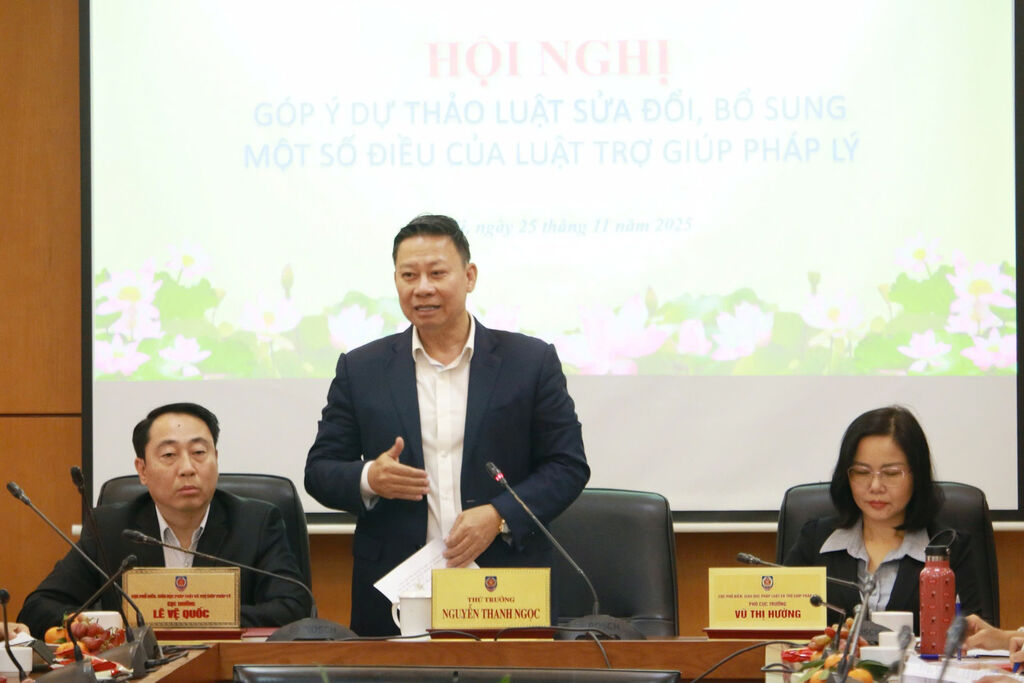 |
| Deputy Minister of Justice Nguyen Thanh Ngoc (middle) speaks at the event__Photo: Ministry of Justice |
On November 25, the Ministry of Justice held a conference to collect opinions on the draft Law amending and supplementing a number of articles of the Law on Legal Aid. Deputy Minister of Justice Nguyen Thanh Ngoc chaired the event, joined by Le Ve Quoc, Director General of the Department of Law Dissemination and Education and Legal Aid.
In his opening remarks, Deputy Minister Ngoc emphasized that after nearly eight years of implementation, the 2017 Law on Legal Aid has embodied the Party and State’s humanitarian policy of “leaving no one behind” in the field of law and law enforcement, particularly for vulnerable groups. The Law, he noted, has made important contributions to improving the legal system, strengthening law enforcement, and raising legal awareness among the public. However, its implementation has also revealed several difficulties and shortcomings that now require legislative revision.
He expressed hope that delegates would offer active and constructive input. Such contributions, he said, would provide crucial guidance for the Ministry of Justice and the drafting committee in refining and finalizing the draft Law, ensuring both quality and timely progress while meeting digital transformation requirements and the practical needs of local legal aid services.
At the conference, Vu Thi Huong, Deputy Director General of the Department of Law Dissemination and Education and Legal Aid, stated that the amendments aim to address limitations of the 2017 Law; revise and supplement provisions to better guarantee citizens’ rights to legal aid; reflect the country’s socio-economic conditions; enhance the professionalism and effectiveness of legal aid work; and ensure consistency across the legal system in line with ongoing judicial and administrative reforms and the current two-tier local government model.
Accordingly, the draft Law expands certain categories of individuals eligible for legal aid, ensuring broader access for vulnerable groups and aligning with international practices and treaties to which Vietnam is a party.
Specifically, the draft revises eligibility criteria to align with the Law on Prevention and Combat of Human Trafficking and the Law on Justice for Minors; replaces the phrase “victims in domestic violence cases” with “persons subjected to domestic violence in cases related to domestic violence,” in line with the Law on Domestic Violence Prevention and Control; and broadens the category “persons with disabilities with financial difficulties” to simply “persons with disabilities,” recognizing that disabilities, whether physical, intellectual, or mental, may hinder access to social and legal services regardless of financial condition.
The draft also expands the category “biological parents, spouses, children of martyrs and persons who raised martyrs during childhood who are in financial difficulty” to “biological parents, spouses, children of martyrs and persons who raised martyrs during childhood,” removing the financial-hardship requirement. This reflects the special status of families of those who rendered meritorious service to the country.
Notably, the draft introduces the category “foreigners entitled to legal aid under treaties to which the Socialist Republic of Vietnam is a contracting party,” enabling compliance with current and future international obligations. It also adds “other persons as provided by law” to account for future expansions introduced by other legislation.
The draft further revises provisions concerning legal aid providers, amending qualification requirements for legal aid officers and standardizing criteria for legal aid collaborators to match those of legal aid officers. It also broadens the scope of legal aid services by removing restrictions on “business and commerce,” thereby institutionalizing new Party orientations and supporting the development of the private sector in line with legal aid policy.
Contributing to the discussion, Dao Ngoc Chuyen, Vice President of the Việt Nam Bar Federation, supported expanding the groups eligible for legal aid. Removing the requirement that persons with disabilities demonstrate financial hardship, he said, addresses a major shortcoming. He also endorsed incorporating categories defined in specialized laws to ensure consistency but cautioned that extending eligibility to “foreigners” and “other persons as provided by law” may be too broad and should be approached with care.
A representative from the Department of Justice of Quang Tri province also supported expanded eligibility for families of martyrs, noting that Vietnam has implemented effective gratitude policies for these groups, particularly in the field of legal aid. The representative proposed adding near-poor households (without requiring proof of hardship) who are victims in cases to the eligible group, and agreed with expanding the network of legal aid collaborators and updating the criteria for legal aid officers.
A representative of the Ministry of Home Affairs expressed support for revising provisions allowing State Legal Aid Centers to establish branches, noting this would better reflect practical needs. The ministry also agreed with including family members of martyrs among those eligible for legal aid.
In his concluding remarks, Deputy Minister Ngoc stated that the Ministry of Justice had received numerous thoughtful and substantive opinions from central and local agencies, experts, organizations, and legal aid practitioners. All contributions, he said, reflected a strong sense of responsibility, close attention to practical realities, and a multi-dimensional perspective, offering important insights for improving the draft Law.
On behalf of the Ministry’s leadership, the Deputy Minister appreciated the dedicated participation of delegates and requested relevant units to continue close coordination and submit further written comments for the drafting committee’s study and incorporation.- (VLLF)









